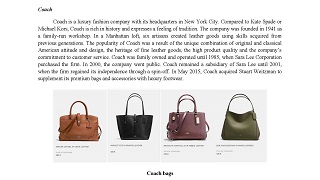2 nouvelles études de cas publiées par le Professeur Ashok Som

Le Professeur Ashok Som, Responsable du Département Management à l'ESSEC, a publié deux nouvelles études de cas ce mois-ci :
The case presents Front Row Tribe, an Italian startup active in the online rental service of luxury garments. Launched in Milan in June 2015 by two young girls united by a passion for fashion, Front Row Tribe constitutes a new paradigm in the Italian fashion panorama. Front Row Tribe is a web platform offering some of the hottest designer pieces of the season, for rent. The intention is the one to bring luxury at the pocket of common customers. Front Row Tribe's innovative business model opens the discussion to the potential disruptive role of the sharing economy in the luxury industry. The concept is not new in the U.S., where Rent the Runway, founded in 2009, proposed a similar online platform and experienced a great success.
Michael Kors is a global luxury lifestyle brand which conveys a jet-set aesthetic by combining elements of style, elegance and sport. Although the company offers a wide range of products to women and also to men, it is primarily known for its high quality handbags at yet affordable prices. The company was established in 1981 by Michael Kors, a now famous fashion designer based in New York. In 1997, the brand escaped bankruptcy thanks to an investment by LVMH, for which Kors started working as creative director of Celine the same year. After LVMH had sold its 33 percent stake to apparel moguls Silas Chou and Lawrence Stroll in 2003, the brand grew swiftly. In 2011, its IPO was one of the largest and most successful in the fashion industry so far. Today, Michael Kors is present in over 100 countries with total revenue of USD4.7 billion in April 2016. One of the many reasons for the company's success is its ability to offer 'affordable luxury' as well as Mr Kors' image in the field, perfectly representing the brand and reinforcing its image by keeping close relationships to celebrities. After several years of storybook results, the brand now has to deal with a risk of over-exposure. This case discusses the positioning of Michael Kors within the luxury industry as well as the brand's future development. More specifically, it addresses the following questions: (a) Which global expansion pattern did Michael Kors follow over time and how is the brand positioned in today's luxury industry? (b) How did Michael Kors become such a powerful brand and what makes the brand distinctive from its competitors? Which role does Michael Kors as a person play in the evolution of the brand? (c) What are the key aspects of Michael Kors as an American brand to succeed as a luxury brand? Which role did the state play in this evolution? (d) How can Michael Kors succeed in the future?
Pour plus d'informations sur l'utilisation de matériel pédagogique tel que ces études de cas, cliquez ici.
Pour plus d'information sur la production et la diffusion de contenus pédagogiques, cliquez ici.



